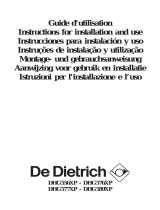
• 1 HOW TO INSTALL THE HOOD
37
In order to ensure the Downdraft pro-
per operation, installation instruc-
tions shall be carefully followed.
1) Drill a rectangular hole in the rear
side of the kitchen worktop of the fol-
lowing dimensions:
Downdraft 90 Cm: 794X106mm
Downdraft 120 Cm: 1094x106mm (g. 1).
2) In case of gas hobs, the minimum di-
stance from the downdraft edge to the
hob rear edge shall be of a least 60 mm
3) Before making the hole, check that
there are no structural or other parts in-
side the cabinet, where the appliance is
to be placed, which could hinder a pro-
per installation. Check that the overall
dimensions of the Downdraft and its
motor are compatible with the cabinet
so that the installation can be carried
out properly.
4) In the version with internal motor, it
comes with the motor xed to the ap-
pliance in order to avoid any damage
during transport: you need to disas-
semble it before starting any installation
operation.
5) Apply the glue on the lower side of
the frame (g. 2).
6) Fit the Downdraft inside the cabinet
by inserting it from above , without re-
moving the glass and panel protections.
7) The appliance frame shall perfectly
adhere to the kitchen upper work top .
8) Secure the hood inside the cabinet by
using the two brackets provided (g. 3).
9) Mount the motor on the hood body
and direct the air outlet to the desired
position , either upwards or downwards
(g. 4).
10) The motor can be installed either on
the front or the rear side of the down-
draft .If you choose to install the motor
on the rear , please follow the procedu-
re below:
remove the plate found on the rear side
of the hood. Fit and fasten the motor
where the plate was placed ,; properly
connect the motor cord; Fix the plate on
the front side of the appliance to close
the opening.
Fit the air exhaust duct (not provided
with the appliance) . Connect the other
end of the duct towards the outside of
the cabinet if you choose to have your
hood working in the ltering mode (g.
5) or towards the outside of the building
if you choose to have your hood working
in suctioning mode. Caution: do not
drill any other hole on the appliance,
in order prevent any damage on the
sliding internal components and on
the electric ones, as well.
11) Connect the appliance to the power
supply.
12) Start to open the extractable unit
(see ‘How the hood works’ chapter)
and remove all the protections (g. 6-7).
Then open the small door (g.8) and re-
move all the protections.
Remove the PVC protection from the
grease lters and place them as shown
in g. 9.
USAGE
This appliance is intended to suck coo-
king fumes, greases and steam. It has
been designed to work in both suctioning
mode, with outside evacuation, and lte-
ring mode. Exhausting piping is not sup-
plied with the appliance.
NON-RETURN VALVE LOCKING
Caution; before connecting the air
exhaust duct , make sure the non-return
valves can rotate freely.
The non-return valve prevents wind and
back air from entering.























